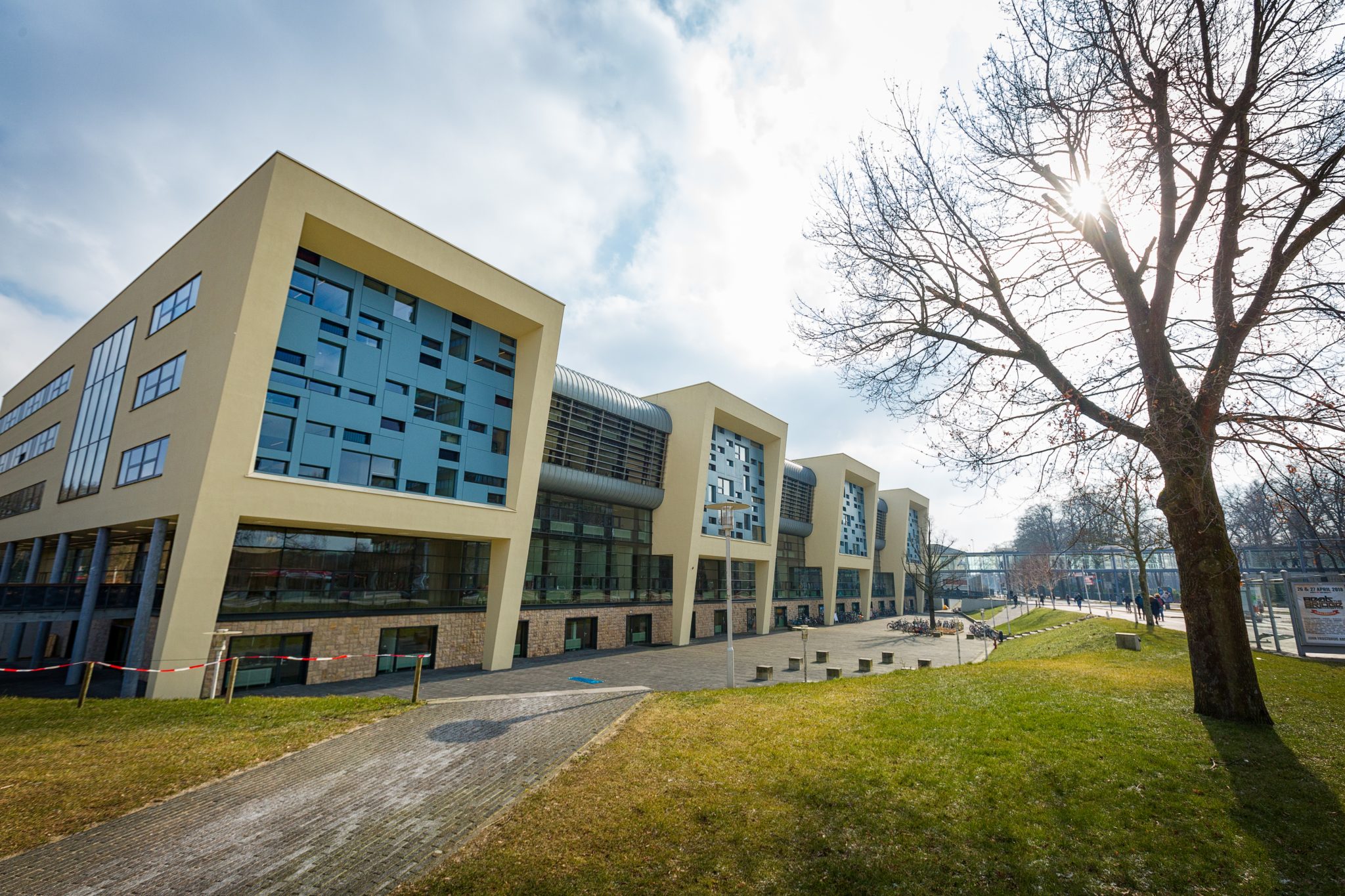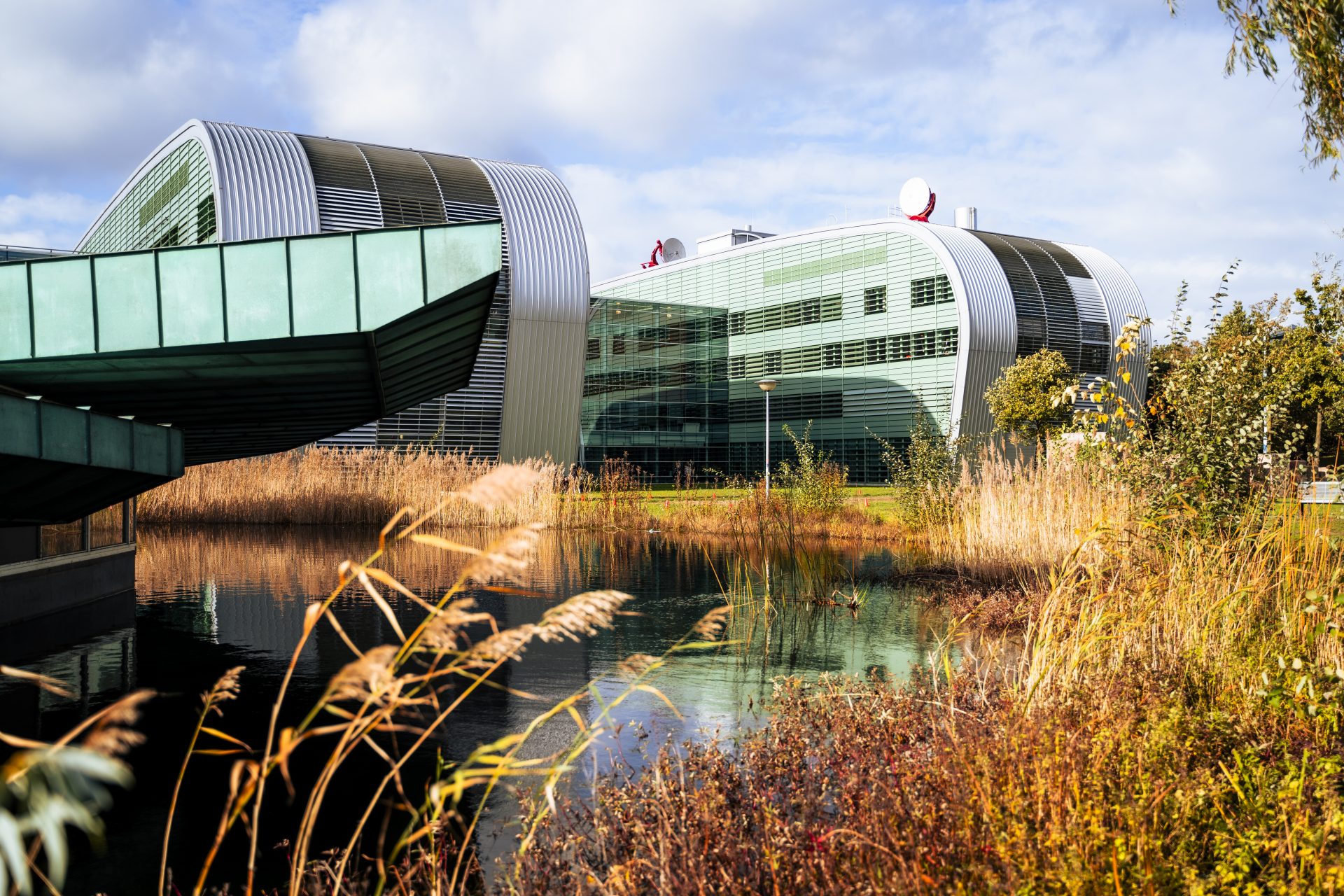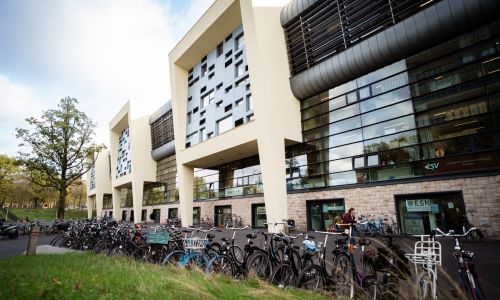The golden years are over: ‘All faculties need to get to work’
-
 Illustratie: JeRoen Murré
Illustratie: JeRoen Murré
While Nijmegen School of Management has declared a vacancy freeze, the Faculty of Science is shelving its plans to expand the Huygens building. For years, Radboud University had plenty of money, but now it is tightening its purse strings. What are the consequences of this?
How fast can the wind change direction? At Nijmegen School of Management, the answer is very fast, as staff and students have discovered since the beginning of this academic year. For years, money was not a problem at the Elinor Ostrom building – just publishing all the vacancies was a full-time job. And this had the desired effect, as the number of researchers within the Faculty grew from 225 full-time jobs in 2020 to 356 in 2023.
New Vox
This story is part of the new Vox magazine, which is all about money. After some good years, the university is back to budget cuts. And not just the university, but its students as well, with the cost of living on a steep incline. Fortunately, the return of the basic study grant can help to stop the bleeding. Next week, you can find the latest issue in the stands all over campus.
This large-scale investment was made possible by additional funding from The Hague. The cabinet supplemented the University budget with incentive grants, study financing resources and sector plans, among other things. The Nijmegen Executive Board generously diverted this money to the faculties to attract new staff and strengthen teaching.
Growing student numbers, especially at Nijmegen School of Management, further filled the money pot. Between 2020 and 2023, the Faculty’s budget grew by €12 million. Even with rising costs, the sky was the limit on the east side of Heyendaalseweg.
Financial quagmire
Until suddenly in September, alarm bells started to sound. The Faculty was in financial difficulties and the Board was forced to take crisis measures with immediate effect. If they didn’t, the management scientists were already looking at a loss of €4.6 million in 2023. With a budgeted deficit of €8 to €9 million, the Faculty would sink much deeper still into the financial quagmire in 2024. By comparison, the Faculty receives just under €40 million a year from the Executive Board.
From that moment, all outstanding vacancies were cancelled, student assistants were put on hold, and researchers were discouraged from claiming travel or equipment expenses. Temporary staff who had not been promised a contract renewal lost out. Even the traditional Christmas gathering is not taking place this year.
The news hit like a bomb. From one day to the next, people were afraid for their jobs. ‘The uncertainty that this brought really took its toll on the staff,’ says Gaard Kets, Assistant Professor in Political Science and member of the Faculty Council. He says that communication from the Board at that time was still very limited, which only added to the uncertainty. ‘It then took another month before things became clearer.’
The Faculty Board now believes it has a pretty good overview of what might have caused the sudden financial shortfall, although Interim Dean Michiel Kompier remains cautious. ‘We also ran into surprises in our analysis of the financial situation. I don’t rule out another surprise popping out of the closet.’
In its budget for 2024, the Faculty writes that the current financial situation cannot be attributed to one single factor, but results from several, sometimes reinforcing factors, combined with limited monitoring of and insight into financial developments.
One such factor is a lower student intake than expected. Because universities formulate their budgets based on expected student numbers, a lower intake rate quickly leads to problems. The financial consequences run into millions: for the 2024-2025 academic year, Radboud University as a whole will receive €7 million less from the Dutch government than it was counting on.
In addition, salaries have increased by 9% in 2023, an increase that is not fully compensated for by the government. Furthermore, the University cannot escape higher costs due to inflation and rising energy prices. After all, even in times of crisis, buildings still need to be heated.
A different reality
All these external factors affect the University as a whole. Yet it is only Nijmegen School of Management that is in such deep trouble. What’s going on there? The Faculty budget speaks of ‘limited monitoring’ of finances. This can be explained by the fact that last year, the Dean and the Administrative Director stepped down in quick succession. Former Dean of Social Sciences Michiel Kompier started as Interim Dean in March. The new Administrative Director started work in May. When they took office, they were told there were ‘some issues’ on the table, but not that there were any major financial concerns. ‘Unexpectedly, the reality turned out to be quite different,’ says Kompier.
But the Faculty would have been in financial trouble even without changes on the Board, Kompier stresses. So the question remains of how it is possible for a faculty to be so surprised by an impending loss of millions. The same goes for the participational bodies, which only last year questioned the Faculty Board about the sustainability of the financial course it was taking. The reassuring answer was that it was permitted and it was possible.
‘All kinds of incentive measures were available and we were too late putting a stop to this’
The financial problems also raise questions about the Executive Board’s monitoring of the Faculty. A spokesperson for the Board informed Vox that the Faculty’s finances are monitored on a monthly basis. ‘The Faculty’s figures for the first three months of 2023 weren’t yet worrying enough to necessitate intervention.’ It was only later that the Board became aware of the financial concerns.
Kompier thinks that the Faculty is to blame. ‘We got more students and the workload was tough. We were then allocated additional resources for teaching and research, and we appointed a lot of staff. All kinds of incentive measures were available and we were too late putting a stop to this.’
Indiscriminate cuts
So now what? How are management scientists going to avert the crisis? The Faculty may still present red figures to the Executive Board until 2027, but after that it must show a break-even. This means a few more years of substantial cuts, which the participational bodies are very concerned about.
According to Representative Council member Gaard Kets, there is a reason why the Faculty hired so many people in recent years. ‘It was overdue maintenance. Nijmegen School of Management had the worst student-staff ratio of the entire University. Lecturers were under huge work pressure.’ With the Faculty once again changing course, Kets fears that all the efforts of recent years will be undone. ‘Is that what we want?’
‘We don’t want layoffs, but we will have to start redistributing tasks’
According to him, thinning the staff will undeniably affect the quality of education. Students will be getting more multiple-choice exams, lecturers will opt for large-scale teaching, and they will have less time to supervise theses. The Faculty is already heading in that direction, as lecturers can no longer rely on student assistants and hired external lecturers.
Kets: ‘For years now, we have offered the best Political Science study programme in the country. You’ve got to think carefully about what these cuts mean in the long run for the position of a study programme like ours. Otherwise, you risk creating a downward spiral, with fewer students and less revenue.’
Dean Kompier takes a different view. ‘A Faculty can’t survive without a healthy administration. We can’t push the problems further down the road. We must take action now and stick to the step-by-step downsizing. This can and must be done.’
Wealth
Cutbacks or not, Radboud University is still very wealthy. Its liquid assets amounted to over €118 million at the end of 2022. That is the money the University has in its coffers. In 2022, this amount increased by €42.6 million due to additional investments from the Dutch government.
In recent years, the Executive Board insisted that faculties invest more in staff to reduce workload. Faculties were therefore allowed to operate with limited losses. By 2027, the Boards wants all faculties to have eliminated their deficits.
Real estate projects, such as the Faculty of Arts moving to the Spinoza building, are also financed from the liquid assets. This project has a budget of €106 million (spread over the years 2022-2031). For the upcoming refurbishment of the Erasmus building, the University has currently budgeted €82 million.
But that isn’t the whole story, argues Kets. For years, part of the Faculty’s annual budget flowed back to the University because not all the money was used up. ‘As a result, our Faculty has contributed substantially to building up the University’s reserves.’ According to the participational bodies, this amounts to some €8.6 million. Kets therefore calls – also on the Executive Board – for this money to be freed up to cushion the initial blows and avoid having to make huge cuts to teaching and research.
But it’s not as if there is another ‘earmarked case of gold bars’ in the Executive Board’s vault, Kompier stresses. Should the Faculty continue to run into red figures, it will be at the expense of the University as a whole. The losses that the Faculty may incur between now and 2027, and that total €12 million, will have to be borne by the University.
So the Faculty will go into the new year with its purse strings held tight. The ultimate goal: to avoid a reorganisation – possibly involving compulsory redundancies. Incidentally the fear of this has not been dispelled. As Dean Kompier points out, there may be more setbacks. What is uncertain is what a new cabinet, potentially led by the PVV, will do with the funding of higher education. So will the Faculty’s crisis measures be enough?
‘The cuts will affect Dutch society as a whole’
Professor of Political Geography and Director of the General Education Union (AOb) Arnoud Lagendijk believes that, in any case, the Faculty should not be too negative about the idea of reorganisation. A reorganisation is now regarded as a doomsday scenario, as layoffs may occur, but not all reorganisations are the same. ‘The current vacancy freeze results in gaps in the organisation, and you have to decide how you want to deal with this. We don’t want layoffs, but we will have to start redistributing tasks. To remain healthy, a functional reorganisation may be necessary.’
Insatiable greed
Nijmegen School of Management is not the only faculty to experience some trepidation in drawing up its budget for next year. ‘All faculties need to get to work,’ says Director of Finance & Control Arjen Peters. Peters is responsible for making sure that by 2027, no University department is spending more than it brings in. ‘So the advice of the Executive Board is to be more prudent with finances, although we have to be careful that the quality of our work remains high. Workload remains a cause for concern.’
This is also felt, for example, at Radboud Services, the department responsible for non-academic services such as HR, Marketing, and Real Estate. Employees are already noticing that expiring contracts are not automatically renewed. A wake-up call is the fact that Radboud Academy – the University’s flagship institute for lifelong learning – has to cut back expenses by 20%.
Even a successful faculty like the Faculty of Science can’t escape the pain. And that while STEM researchers are reputed to be champions when it comes to attracting grants. ‘But no matter how much money you give us, it will never be enough,’ says Dean Sijbrand de Jong. ‘We are often portrayed as being insatiably greedy, and that’s completely justified.’
The Faculty of Science will also have to take measures to achieve a zero budget in 2027, explains Administrative Director Karen de Bruijn. ‘Inflation hits us extra hard because we have more materials, equipment and energy costs than other faculties.’
Housing is a major expense for the Faculty, as it rents relatively a large amount of square metres from the University. And these costs are increasing. Certainly laboratories, which are more expensive than office spaces, weigh heavily. ‘We were confronted with a 10% rent increase two years in a row, which amounts to approximately €1.5 million extra per year,’ says De Bruijn.
Extra workload
Like Nijmegen School of Management, the STEM researchers invested the extra state funds in more staff. But those extra funds have already been halved for next year. Luckily, the Faculty mostly appointed PhD candidates, says De Bruijn. ‘They will be done in a few years.’
The downside is that, as a result, the Faculty will have 70 to 80 fewer government-funded PhD candidates in 2027 than at present. The Faculty hopes to make up for this by appointing as many PhD candidates as possible with indirect government funds. By submitting proposals to the Dutch Research Council (NWO), for example. But that pot isn’t getting bigger either, says De Jong, which is why he predicts huge competition. ‘With all the implications for workload: it takes about a week to write a proposal. With a 20% success rate, you have to write an average of five before you get a PhD candidate.’
Moreover, De Jong continues, the Faculty will also feel the effect of a declining number of PhD candidates on the revenue side, as each PhD defence brings a bonus from the government. ‘I’m very worried we will end up in a downward spiral, unable to meet the needs of society.
‘I’m very worried we will end up in a downward spiral, unable to meet the needs of society’
The cuts will affect Dutch society as a whole. Fewer of our PhD candidates will be available to companies like ASML.’
Education will also suffer from the cuts. Since PhD candidates at the Faculty of Science spend 10% of their working hours teaching, a loss of eighty PhD candidates is equivalent to eight full-time teaching positions. ‘We have to get those from somewhere,’ says De Jong. ‘You need money to pay staff members or student assistants. That means we have to lose people from other positions. He expects that this will create additional work pressure in every way imaginable: not only in terms of hours worked, but also in declining job satisfaction, which makes the work feel heavier.
Broom cupboard
Some years ago, Vox wrote about a Faculty of Science professor who had to work in the broom cupboard, due to lack of space. The Faculty has faced an acute lack of space for years. The Campus Plan, in which the University presents its view of the 2030 campus, therefore includes plans to expand the Huygens building, for example by adding a wing. The Mercator building is also mentioned as a fall-back option.
All these options are off the table for now, De Jong says sadly. ‘Office space in a new building, even if it is only a fifth of our current capacity, can easily cost a few million euros. As it stands, we can’t pay for that without dismantling some departments – in which case we would no longer need that building.’

Meanwhile, the Faculty is trying to solve the lack of space internally. Offices in the Huygens building are being converted into lab space, because that is what there’s a need for, and new professors often have specific requirements in terms of equipment. In 2020, the building still had a standard of 10 square metres per person. That has since been adjusted down to nine, and one department is now running a pilot with eight square metres.
According to the Dean, most people within the Faculty are aware of what is happening. ‘People here are quite pragmatic – they get it,’ he says. ‘But whether it has completely sunk in psychologically, I don’t know. Let’s face it: right now we are at an all-time high, things have never been better in terms of equipment and number of PhD candidates. It’s just unfortunate that this situation can’t last forever.’
When will employees start to feel that things are getting tougher financially? ‘In the last weeks of this year we are already going to be more frugal,’ says De Jong. ‘But in 2026, things will get tough,’ adds De Bruijn. ‘By that time, we will have had to make serious cuts.’ The idea is that students will not notice any of this for the time being, but the administrators are not sure how sustainable that is.
Is the Faculty afraid of losing top international researchers to universities abroad? ‘I have absolutely no fear of that,’ says De Jong. ‘There are still advantages to working in the Netherlands. Moreover, these employees are very loyal.’ But attracting new top players will be harder, he admits. ‘Because we can’t offer them such good lab facilities, PhD candidates and technical and secretarial support as before. In Germany and England, there are often a lot better opportunities to set up your own group than here.’





